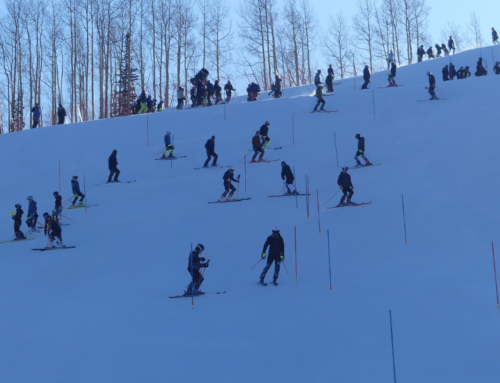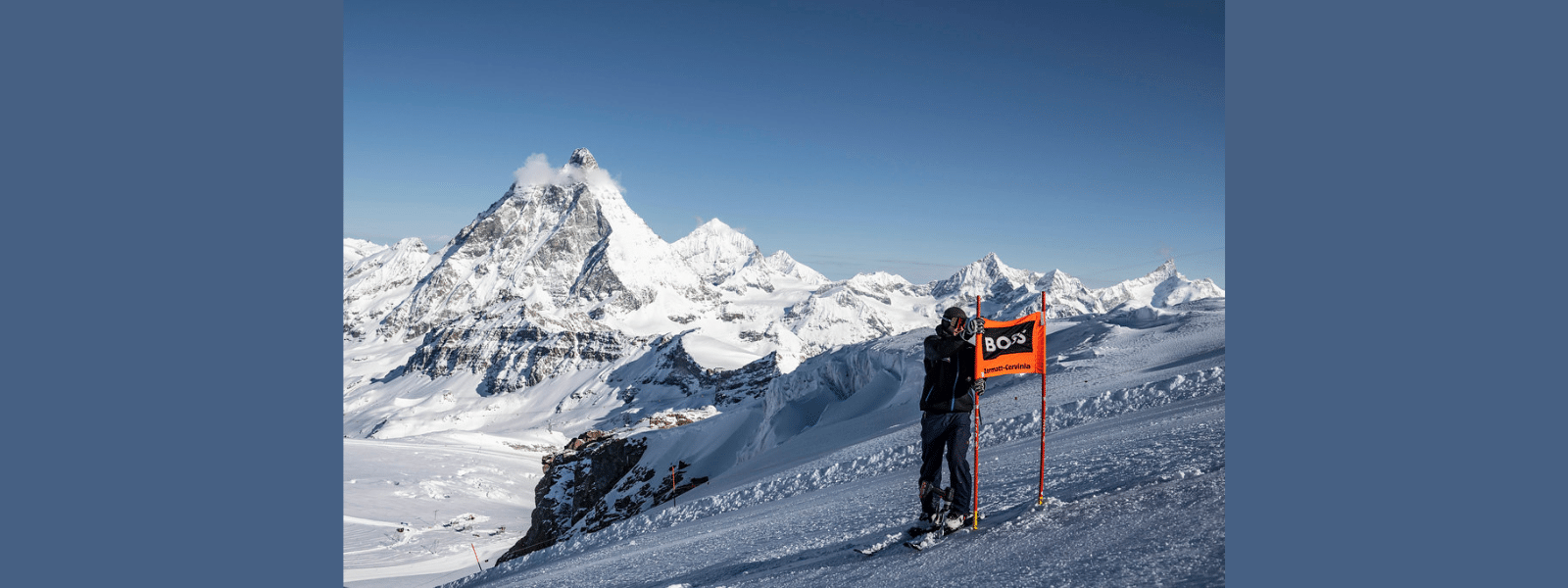TORINO: USSA CEO Bill Marolt's State of the Olympic ski team address
TORINO: USSA CEO Bill Marolt’s “State of the Olympic ski team” address{mosimage}USSA CEO Bill Marolt addressed a select group of media Saturday, the last day of alpine competition of the Torino Olympic Winter Games. Here are Marolt’s remarks — made before the men’s slalom — followed by some questions and answers:
Bill Marolt: There were times during the Games where you wanted me to talk about where we were and what we were doing. I preferred to wait till the end so we know where we are and what we have done. We still have another event where we have the opportunity, without question.
As you all know, we set a goal of coming in here to be best in the world. We set that goal a number of years ago, actually in ’97 we sat down and wrote a mission and a vision and in that mission and vision we set out to become best in the world. And we defined that by winning more medals in skiing and snowboarding than any other nation. I think through the period of time since we established that goal that we have done a good job in setting targets that we shot for an annual basis, that we’ve done a good job in allocation of resources, and in each passing year we have improved our performance. We’ve built on good World Cup performance, good performance in the World Championships. We had a good 2002, we hit our targets there.
So as we approached this season, we really came into it feeling that we had planned and prepared well, and that if we came in and executed against that plan we would hit our targets. We haven’t done that …
I know everybody wants an explanation of why did this happen, why didn’t it happen, and I guess there really isn’t one. You are all sportswriters and you’ve sat in a lot of postgame analysis where the winning coach has his side of the story and the losing coach is saying that I really don’t have an explanation. We’ve got the talent, we’ve got the good coaches, and we believe we have a good plan, and the momentum or whatever needed to spark us just didn’t happen. And so we sit here today.
I am not discouraged by any stretch of the imagination and as I look at what we have in place and where we’re going, we will continue on this course. Our challenge and goal to be best in the world won’t change. I think that it is a noble goal and one that has set us aside as an organization.
And when we talk about being the best in the world, we didn’t just talk about being the best in the world in terms of athletic program. We want best in the world performance by our entire staff. … I think that we have built a really good professional sports organization. One that over the next years will continue to grow and continue to prosper. I think that given the quality of our development programs, our ability to find resources, we will continue to invest and continue to build the organization and hopefully in four years we can sit here and we can say we’re the best in the world.
Our course won’t change — an organization reflects the personality of the leadership — and that’s just where I am. That’s where I want to be and that’s where I want our organization and that’s where I want us to go.
Having said that, I do recognize those individual athletes, those 10 people that have done a great job here. We’ve won five gold medals, and that’s a significant accomplishment of the 10that we have won. All of these people did perform at the highest level. The most recent success, Julia Mancuso yesterday. There has not been a tougher competition in our arena than what she faced yesterday. Difficult conditions, snowing, difficult light, and she performed, every split time in both runs she was ahead, and she didn’t back down at the start. She didn’t try to protect her lead, she went out to try and improve on her lead. That’s the kind of performance and personality that we want this organization to have.
On Julia Mancuso and the women’s alpine team.
Marolt: We’ve known for a number of years now that we have a really talented young women’s team and the 21-year-old competing and performing at that level sends an awesome message to the women on the team, and also to the youngsters coming up the ladder. So it came at a great time for us very frankly. It was good shot, a good shot of juice. It picked us up and it is a credit to her and what we want the organization to be. Never give up, and never give in.
Where are you with Bode Miller?
Marolt: I think if you look back at his career and you look at what he has done, he’s been a remarkable performer. He has an interesting personality. Like all great performers, they all have strong personalities, they all have quirks, and they’re not easy to manage. … The great ones have personality. That’s what separates them, that’s what makes them different, that’s what makes them better. Our challenge is to figure out how to do a better job of managing, that’s what we’ve got to do.
Did Bode underachieve?
Marolt: That can happen. Athletes don’t achieve 100 percent of the time. A little bit of the answer here is that we still have part of the season left. We’ve got to evaluate what we did well here, what didn’t we do well, because clearly there were things that we’ve got to download, analyze and say OK. We’ve learned a lot over the last four years. I’ve been involved in this for 40 years basically, and like everyone says, you never stop learning. You always get a surprise that you don’t expect. So we’ve got to figure out where did we really do well, where do we have to improve, and then build that into our program going forward.
What is the cost/benefit of Bode Miller over the last six months?
Marolt: I think you have to look at Bode over the last eight or nine years and what he’s meant to our sport, what he’s meant to our team, what he’s meant to our organization. And along the way it’s been … I won’t deny it’s been a challenge. All I can say is I took that trip to Wengen, which you all were aware of, and I was standing on that downhill and when you see that big horse coming at you, you’re damn glad that he’s on your team.
How much rope is left for Bode?
Marolt: We’ve got to sit down and have a heart to heart at the end of the year. It’s not something that we should have conversations like this in the media, so I won’t have those kind of conversations. But clearly it will be something that we’ll address at year end and I don’t know where that will go right now.
Is Bode’s drinking a concern to you?
Marolt: Part of our responsibility as an NGB and part of managing these kinds of organizations are to create positive environments for out athletes to achieve in. But also part of our responsibility is to make sure that we’re teaching the right kind of values. That’s important to us, it’s important to me. Again its not always easy to do that, but we will strive to do that. We’ll strive to help create a stronger foundation from which these youngsters can propel themselves forward in their future careers.
It doesn’t appear that Bode came in here prepared …
Marolt: Again, those are things we are going to have to go through and talk about.
Discuss the team as a whole.
Marolt: The model is one that we have developed over a period of time. It is one, like any good model or plan, has to be adaptable as you go forward. … What we really find, and that is what makes an Olympics so difficult, is that it only happens once every four years. And sometimes in the intermediate years, the difficulty of winning a medal tends to fade in your memory a little bit. It’s damn hard to win a medal.
Talk about the performance of the freestyle team and Jeret Peterson.
Marolt: The freestyle team was, again, a team that has competed with the best in the world, and has been best in the world, and it is one that is like alpine; we needed to be better there. As far as Jeret, that was unfortunate. We felt the best thing was to give him a time out and send him home.
On coaches and changes and alpine staff.
Marolt: I think in general across the company we’ll have pretty good consistency. My hope is that we will have consistency, but as you said, a lot of the individuals in this organization have been around a long time and I think that the key issue there is I want to have that continuity and consistency within the program, but we need to make sure that the people who are on board are fired up and enthusiastic about going forward. I think the most important things that our leaders and our coaches have to have is the passion and enthusiasm. They have to be really excited about what they are doing going forward. And we won’t really know that until we get through the finals of the World Cup and have the chance to sit down.
How can challenges, managing Bode, be resolved?
Marolt: Again, it goes back to the challenge of managing talent, and it’s frustrating. It’s frustrating for particularly the guys that are on the line everyday. They work hard, they work long hours and our challenge is do it better.
On the future talent of men’s team.
Marolt: I think you’ve got [Ted] Ligety, you’ve got [Steve] Nyman, probably Scott Macartney will continue. Marco Sullivan is well on his way back. Jimmy Cochran is a talented young guy. We’ve got a good core, we really do and frankly we have to take that next level of athlete coming up and do a good job managing them.
Thoughts on Daron Rahlves.
Marolt: I just … as you all know, I have the highest regard and respect for Daron Rahlves. I mean he is a cornerstone guy. And he never gives anything less than his best, and I’ve never seen him not give his best. So it’s just one of those inexplicable things. He had big results all year. He won a downhill in Wengen. Anybody that follows international ski racing and you look at a downhill that would be difficult for Daron Rahleves to win, it’s the Lauberhorn. And he just flat did a job there. So that’s one of the difficult and frustrating issues that we have right now.
On Lindsey Kildow.
Marolt: I think the biggest point with Lindsey, you know, she took a hell of a fall. And the initial reports were that nobody knew how serious it was. But for her to go to the hospital, get out of the hospital, and come up here and train and race speaks to her character and speaks to her desire to do well. And again, that goes back to the future, in particular, of the women’s alpine team. We have a core group of women there. That could be one of the strongest parts of our program going forward.
On the U.S. team being the face of USA for the Olympics/Bode.
Marolt: [Bode Miller] put a face on the U.S. Olympic team, but he put a face on the Olympics. There’s a lot of people that didn’t know about the Olympics in our country until Bode started appearing on Time and Newsweek. He’s meant a lot to the sport, he’s meant a lot to the team and like I said, when you’re standing on the side of that big downhill and he’s ripping at you, you’re damn glad he’s on your team.
Are you reluctant to be critical of Bode Miller?
Marolt: I don’t think this is a place where you talk about personnel and personnel issues. You all manage people and you wouldn’t sit and make a personal decision or evaluation.
You put Bode out as marketing tool …
Marolt: He has put himself out front through his results. And our entire men’s team put themselves out there because they’ve had great results. That’s what creates the expectation is great results. You can’t have expectation, and you can’t have a lot of notoriety, and PR and publicity without performance. I could come in here and tell you all the things in the world I wanted to tell you, but if I didn’t have anything to back that up it would be pretty hollow. These guys performed. This is not a group that hasn’t performed. You have to know that.
On the finances and resources of the Austrian team vs. the U.S. team.
Marolt: I learned a long time ago, don’t worry about what you don’t have. Worry about what you have, and manage what you have, and be positive about your resources.
Through our own internal ability we have generated good resources. And we’ve had good support from the USOC. So I would never use resources as an excuse. That’s just not the way we operate.
Now, having said that, I think going forward I think we have to as a company grow financially. We need to continue to invest in our elite programs, in the development programs, in our sports science and sports medicine area, which I think we have done a good job of, but we need to continue to get better to find out what technological advantages can help us. And we need to do a great job with our coaches’ education programs. Those are the four cornerstones of what we do. And Alan Ashley and the athletic staff have done a remarkable job in building all those things out. We will continue to push that. We plan to finish an aggressive endowment campaign. We plan to build a national training center in Park City. We plan to invest in infrastructure to help our cross-country program get better. We plan to make a significant increase in support of our cross-country program and the infrastructure there. The reason we want to do it, quite frankly, is that there are a lot of medals on the nordic side that we haven’t had a shot at, and we want to try to take a shot at those.
We’ve got our challenges going forward to 2010 and we’re excited. It’s a North American Olympics in Vancouver. It’ll be good for us in terms of access, it will be good because I believe that corporate America will be very interested in what goes on here.
As for Austria vs. America, can you ever have enough athletes to compete with Austria?
Marolt: I believe we can. I believe we can. They always told us at [the Universiy of] Colorado that we could beat Nebraska too.
Where does the nordic initiative come from?
Marolt: Nordic combined will continue to be a part of it. That is an area where we have emphasized and worked hard. Todd Lodwick is going to retire, but we still have Bill Demong and Johnny Spillane, the Camerato brothers from Park City. I think that’s a strong core of good young guys there. Both Demong and Spillane have been around for a long time and they’re fired up, I talked to them after the sprint over in Pragelato. They’re 24, 25 years old, the perfect age and they’re excited about it.
We have come down the road this far and there is too much of a cross-country community and too much of an opportunity there to not try to figure out a way to do it.
Are you near the top end on skiers with their own RVs:
Marolt: The reason we talk about team a lot is that you need this thing to function as a cohesive, coordinated group. Within certain boundaries we want the kids to be individuals but we need to make sure that we stay focused on the targets and we have a certain level of discipline.





















